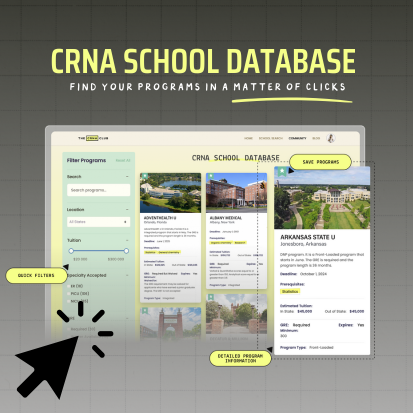You’re wondering how to get into CRNA school. Today, we’re going to go over 5 things that CRNA programs are really looking for in their applicants. If you want to stand out and make an impression, read on future CRNA!
But first, if you haven’t already watched our free masterclass, sign up for that here. In 30 minutes, we dive deep into the strategy behind getting into CRNA school, and how you can stand out and be the best prepared applicant you can be. Also, take a peek at the Resources tab up top, and explore all the free tools we have to help you prepare on your journey to pressing “submit.”
Let’s dive in! So, what are CRNA schools really looking for in an applicant?
1. Someone Well-Rounded
CRNA programs want an extremely well-rounded candidate. Just because you have a 4.0 GPA does not mean you are going to: 1. get into CRNA school, or 2. excel. Now, I’m not saying if you do have a 3.9 or 4.0 GPA, you’re not going to do well. However, what I am saying is that it’s not a guarantee for success.
You have to have the entire package. Do you have research experience? Do you have volunteer experience? Are you a leader on your unit, or on a hospital-wide committee?
2. A High Emotional Intelligence
The second thing that CRNA schools are really looking for in their applicants is a high emotional intelligence.
Working in the operating room can be at times, extremely stressful. There can be a lot of tension, there can be a lot on the line. There are just a lot of emotions that are surrounding the ups and downs of being in such a high pressure environment. You have to be able to deal with personalities in the OR, and be able to manage your own emotions while dealing with critical, life or death situations. How does your emotion play into a situation and your ability to resolve conflict?
Daniel Goleman was really a pioneer in popularizing this topic of emotional intelligence and emotional intelligence, he really breaks it down into five categories:
1. Self-awareness
2. Self-regulation
3. Motivation
4. Empathy
5. Social skills.
Having a high emotional intelligence is something that programs are going to gear their interview questions around. You’re definitely going to be asked about how you handle conflict. “What are some things you do to de-escalate stressful situations?” “How do you communicate with people who do not have the same communication style as you?”
They’re going to ask you things like, “What would you do if the surgeon yelled at you that the patient was moving?” or “Tell me about a time you had a conflict with a colleague?”
Be prepared to answer in a way that shows you’re human, but also emotionally aware.
3. Excellent Writing Skills
The third thing that CRNA schools are really looking for in an applicant is excellent writing skills. Why? DNP programs require a research project that requires a LOT of writing, and a good understanding of the research process.
So, if you are thinking “Ugh. I’m not a good writer, I just know I’m not, it’s not my thing.” Don’t worry, do not stress yourself out (too much). Do you think every CRNA that’s out there is an excellent writer? Do you think every person that has gotten their DNP or DNAP or even PhD has been a great writer? No, absolutely not. But you will need to take a look at your personal essay and your resume a bit closer, and make sure that you have a strategy that will make up for it.
4. Excellent Test-Taking Skills
The fourth thing that CRNA schools are really looking for in an applicant is that they are an excellent test taker. So why is this important? Think – how do schools maintain their accreditation, and how are they still able to stay in business? Answer – their first time pass rates for their certifications exams.
You can find this information from the Council of Accreditation, at COACRNA.org. This website will tell you a school’s first-time pass rates, which is something that schools are really protective of. They want their students passing that certification exam and passing their boards the first time around.
Also, you’re going to be taking a lot of tests in your program. You have to be able to get Bs and pass those. Some schools don’t allow Cs on there on their tests.
So, you might be asking yourself, how do I show CRNA school programs that I’m a good test taker?
You retake science classes that you got less than Bs, and consider taking a graduate level science class to show them that you can handle the rigorous curriculum of this doctorate program.
Lastly,you also prove that you’re a good test taker by taking the CCRN, by taking other certifications, and also by taking the GRE.
5. The Cream of the Crop
CRNA schools are really looking for people who are the cream of the crop. We want the best of the best. We want those people who are go-getters, who go above and beyond, who stand out, who take initiative among themselves, who represent the CRNA profession with excellence.
My point here is anything that you can do to stand out? Do it.
Take those extra certifications. Get a tutor for the GRE. Get a tutor for your science class and get that A.
Volunteering. Figure out how you can get that checkbox on “I have research experience.” Precept. Become a charge nurse. Join committees.
That wraps it up!
Mentioned in this episode:
Watch our free, 30 minute Masterclass, Getting into CRNA School 101



